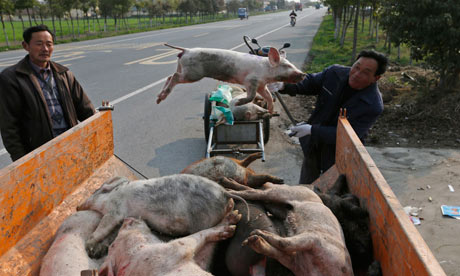China loves pork too much
The thousands of pig carcasses dumped in a river are a symptom of the rush to satisfy the demand for meat
 |
| A worker moves a dead pig on to a truck in Zhulin village, Jiaxing. Photograph: Stringer/China/Reuters |
Over the last fortnight, more than 16,000 dead pigs have been recovered from tributaries of the Huangpu, the river that arcs through Shanghai. Mottled and swollen, adult hogs and piglets were first spotted upstream in Henglaojing creek, their bellies forming pearlescent domes among the river debris. Finding a dead hog in this creek isn't an anomaly. Farmers have been using the waterways as a dumping ground for deceased stock for decades, residents say. It is the numbers that the locals find shocking.
What worries Shanghai residents is that the waterway supplies more than 20% of the city's tap water. Early tests revealed the pigs carry porcine circovirus, which isn't infectious to humans, and the water was ruled safe. Though there has been no official explanation for their appearance, tags in the pigs' ears trace them to Jiaxing in the neighbouring Zhejiang province. Jiaxing is an area where the pork industry flourishes and where 70,000 pigs died this year because of extreme weather conditions and "crude raising techniques", according to state media.
Citizens have responded with outrage to the Henglaojing incident. "That thousands of dead pigs were dumped in the Huangpu secretly isn't news", said Li Mingsheng, a well-known writer, on his weibo (microblog) account. "It's also not news that 20 million Shanghai residents have drunk dead pig broth for half a month. What's news is that the Shanghai water bureau claims the Huangpu's water meets health standards." Others responded more humorously. In one joke spread through weibo, a Beijing resident boasts that he just has to open the window to have free cigarettes. A Shanghai resident retorts: "That's nothing, we turn on our taps and have pork chop soup."
My reaction is more despondent. I visited Zhejiang late last year to report on the booming factory-farm industry, interviewing a young man whose local eco system has been decimated by the arrival of a factory farm. A dead pig in a river is gripping, sensationalist, macabre. But it hints at a deeper crisis: the impact the burgeoning meat industry in the developing world is having on the planet.
As the world's population expands, incomes rise – and we eat more meat. In 1999, annual meat production worldwide was around 218m tonnes. By 2030 it is projected to be 376m, according to the World Health Organisation. To accommodate the extra 2 billion people expected to be alive by 2050, we need to eat a quarter of the meat we do now.
Tell that to the Chinese, who are particularly fond of pork. Mao's favourite dish was hongshao rou, a fatty braised pork belly. The country produces and consumes half the world's pork, around 50m tonnes in 2011. The average person eats four times what they ate in 1980, but a third less than the average Briton.
To satiate rising meaty appetites, animal husbandry is in a state of rapid change. Backyard pigpens, the method by which Chinese people raised hogs for centuries, are being replaced with Cafos (concentrated feeding animal operations), copycats of the American versions, which the Chinese government is subsidising heavily. A Cafo is likely to be where the hogs in the Henglaojing waters came from. Jiaxing accounts for a quarter of the pigs raised in Zhejiang province, around 4.5m each year.
A downside of the Cafo system is that it's inefficient. The amount of grain – usually soy – that it takes to feed so many animals renders the energy ratio from crop to pork at 4:1 (beef is 7:1). They are also breeding grounds for viruses – such as porcine circovirus as seen in the Henglaojing pigs, but also foot-and-mouth disease and hog cholera. More worrying for humans is that the use of antibiotics in Cafos is linked to the development of antibiotic-resistant pathogens. The proper disposal of diseased animals should be a global concern.
From the "hogwash" incident, the Chinese government should take stock. It must move swiftly to regulate Cafos, particularly the smaller holdings that have grown haphazardly and without sufficient checks. The farmers involved in this incident made the unwise decision to dump the carcasses rather than burn them (which is more expensive), but why hadn't the local government stopped similar behaviour before? At least the hogs weren't sold. In October, a court in Jiaxing heard a case in which 77,000 tonnes of dead pigs had been illegally processed and sold as meat to locals. The defendants made 8.6m yuan (£900,000) from the deals.
Chinese friends and acquaintances are initially bemused by my vegetarianism. Despite the country's rich Buddhist tradition, they think it's a quaint, foreign quirk. Something hardwired into the nation's psyche is the association of meat with progress. I find it difficult to explain to people who had one of the world's deadliest famines in living memory that I think people today eat too much meat for the good of the planet and themselves. When I was a child, I ate it every day
***************
Milan, [we] think you are part Chinese....he he
***************
Milan, [we] think you are part Chinese....he he

No comments:
Post a Comment
Comments always welcome!